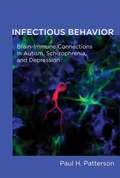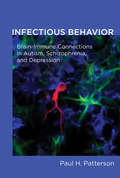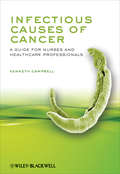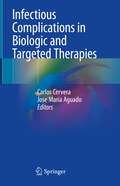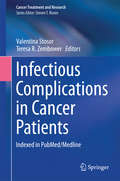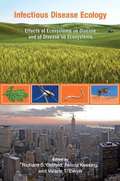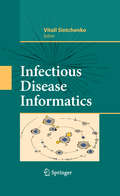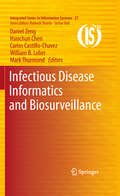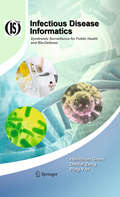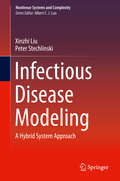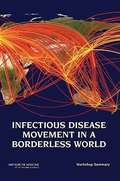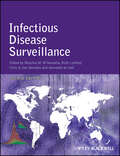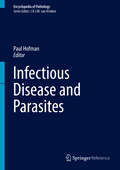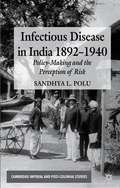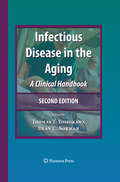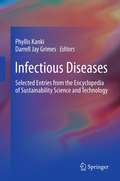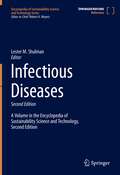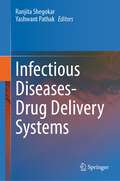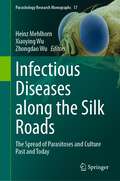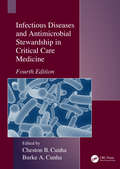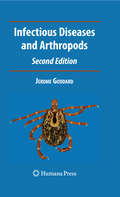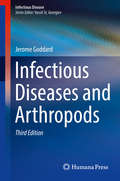- Table View
- List View
Infectious Agents and Cancer
by Anton G. Kutikhin Elena B. Brusina Arseniy E. YuzhalinOver the years of cancer investigation a lot of discoveries in this field were made, and many associations between various biological carcinogens and cancer were revealed. Some of them are credibly determined, thus these infectious agents (human papilloma virus, hepatitis B virus, hepatitis C virus, Epstein-Barr virus, human herpes virus 8, human T-cell lymphotropic virus 1, human immunodeficiency virus, Merkel cell polyomavirus, Helicobacter pylori, Opisthorchis viverrini, Clonorchis sinensis, Schistosoma haematobium) are recognized as carcinogens and probable carcinogens by International Agency for Research on Cancer (IARC). The problem is of large importance, since share of infectious agents-related cancer cases is steadily increasing, reaching 25% according to certain estimates. It is worth noting that many of cancer cases are caused by infectious agents other than «conventional ones» like HPV, EBV, HBV, HCV, H.pylori etc. In recent years, a number of significant breakthroughs in the field were performed, such as the discovery of the microbiota role in cancer causation.
Infectious Behavior
by Paul H. PattersonIn Infectious Behavior, neurobiologist Paul Patterson examines the involvement of the immune system in autism, schizophrenia, and major depressive disorder. Although genetic approaches to these diseases have garnered the lion's share of publicity and funding, scientists are uncovering evidence of the important avenues of communication between the brain and the immune system and their involvement in mental illness. Patterson focuses on this brain-immune crosstalk, exploring the possibility that it may help us understand the causes of these common but still mysterious diseases. The heart of this engaging book, accessible to nonscientists, concerns the involvement of the immune systems of the pregnant woman and her fetus, and a consideration of maternal infection as a risk factor for schizophrenia and autism. Patterson reports on research that may shed light on today's autism epidemic. He also outlines the risks and benefits of both maternal and postnatal vaccinations. In the course of his discussion, Patterson offers a short history of immune manipulation in treating mental illness (recounting some frightening but fascinating early experiments) and explains how the immune system influences behavior and how the brain regulates the immune system, looking in particular at stress and depression. He examines the prenatal origins of adult disease and evidence for immune involvement in autism, schizophrenia, and depression. Finally, he describes the promise shown by recent animal experiments that have led to early clinical trials of postnatal and adult treatments for patients with autism and related disorders. For questions for the author, and updates on the various topics covered in the book since its publication, please check the book's website: http://mitpress. mit. edu/infectiousbehavior
Infectious Behavior: Brain-Immune Connections in Autism, Schizophrenia, and Depression
by Paul H. PattersonAn examination of brain-immune system communication in autism, schizophrenia, and depression.In Infectious Behavior, neurobiologist Paul Patterson examines the involvement of the immune system in autism, schizophrenia, and major depressive disorder. Although genetic approaches to these diseases have garnered the lion's share of publicity and funding, scientists are uncovering evidence of the important avenues of communication between the brain and the immune system and their involvement in mental illness. Patterson focuses on this brain-immune crosstalk, exploring the possibility that it may help us understand the causes of these common, but still mysterious, diseases. The heart of this engaging book, accessible to nonscientists, concerns the involvement of the immune systems of the pregnant woman and her fetus, and a consideration of maternal infection as a risk factor for schizophrenia and autism. Patterson reports on research that may shed light on today's autism epidemic. He also outlines the risks and benefits of both maternal and postnatal vaccinations.In the course of his discussion, Patterson offers a short history of immune manipulation in treating mental illness (recounting some frightening but fascinating early experiments) and explains how the immune system influences behavior and how the brain regulates the immune system, looking in particular at stress and depression. He examines the prenatal origins of adult disease and evidence for immune involvement in autism, schizophrenia, and depression. Finally, he describes the promise shown by recent animal experiments that have led to early clinical trials of postnatal and adult treatments for patients with autism and related disorders.
Infectious Causes of Cancer
by Kenneth CampbellOver 99% of the world's population is infected with at least one potentially cancer-causing organism. It is vital for nurses and other healthcare professionals to be aware of the extent of infection-associated cancer and of how they can contribute to prevention of such cancers.Infectious Causes of Cancer, aimed principally at nurses and other healthcare professionals, considers the epidemiology and biology of infectious causes of cancer. It examines each of the infectious agents associated with an increased risk of cancer, discussing epidemiology of the infection and cancer, pathophysiology of the cancer, mechanisms, associated risk factors, and prevention of the infection and cancer.Key Features:A comprehensive and accessible guide to infection associated cancer and how to contribute to preventionA must-have for students or healthcare professionals working in oncology, primary care or health promotionBrings together all the up-to-date science, evidence and research related to infections and cancer in one publication
Infectious Complications in Biologic and Targeted Therapies
by Carlos Cervera Jose Maria AguadoThis book aims to approach the epidemiology, diagnosis and management of infectious complications related to the use of biologic and targeted therapies. The first part is a general overview on the epidemiology and prevention of infections with the use of these agents. Timelines, pre-treatment evaluation, use of vaccines and travel counseling. In the second part, we will analyze the specific risk of infections associated with the use of the most important agents. The third part approach the problem on a syndromic point of view. For example, how to evaluate pulmonary infiltrates in a patient receiving biologic agents. This part III includes the most difficult and conflicting syndromes that clinicians may face when evaluating these patients.This book is intended not only for infectious diseases specialists, but also for different medical specialties prescribing biologic and targeted therapies.
Infectious Complications in Cancer Patients
by Valentina Stosor Teresa R. ZembowerWhile advances in both the treatment of cancer and the management of its complications have led to significant improvement in patient survival, infections remain a significant cause of morbidity and mortality in patients with neo plastic disease. In this patient population, infection risk results from a complex interplay between the host's underlying immunodeficiencies, local tumor effects and treatment-induced immunosuppression. New chemotherapeutic approaches and antimicrobial prophylaxis and treatment practices continue to shape the spectrum of infections in these patients. Clinicians who treat infections in cancer patients are continually challenged by the emergence of new pathogens and by the increasing antimicrobial resistance of established ones. The aim of this book is to emphasize unique aspects of management of infectious diseases in the cancer patient. With the increasing complexity of this patient population, optimal management requires a multidisciplinary approach and this fact is fully reflected in the contributions, all from recognized authorities in the field. Ultimately, it is hoped that this volume will assist specialists in infectious diseases and haematology/oncology in the diagnosis, management and prevention of infection and optimization of the overall care of patients with malignancies.
Infectious Disease Ecology: Effects of Ecosystems on Disease and of Disease On Ecosystems
by Richard S. Ostfeld Felicia Keesing Valerie T. EvinerGathering thirteen essays by forty leading experts who convened at the Cary Conference at the Institute of Ecosystem Studies in 2005, this book develops an integrated framework for understanding where these diseases come from, what ecological factors influence their impacts, and how they in turn influence ecosystem dynamics. It marks the first comprehensive and in-depth exploration of the rich and complex linkages between ecology and disease, and provides conceptual underpinnings to understand and ameliorate epidemics. It also sheds light on the roles that diseases play in ecosystems, bringing vital new insights to landscape management issues in particular. While the ecological context is a key piece of the puzzle, effective control and understanding of diseases requires the interaction of professionals in medicine, epidemiology, veterinary medicine, forestry, agriculture, and ecology. The essential resource on the subject, Infectious Disease Ecology seeks to bridge these fields with an ecological approach that focuses on systems thinking and complex interactions.
Infectious Disease Informatics
by Vitali SintchenkoThis book will be the first to leverage on recent breakthroughs in the rapid, high-throughput molecular profiling of pathogenic microorganisms, as well as text mining and the growing body of electronic sources of knowledge about the molecular epidemiology of pathogens with epidemic potential. The distinctive feature of this book is that its focus on bioinformatics enabled approaches to pathogen detection, investigation and management of infections. This volume also details new methods of analyzing the genetic and geographic data of pathogens to reconstruct their evolution and to identify the migration routes through which the strains spread regionally and internationally. This book will fill the existing gap in covering the bioinformatics aspects of infectious diseases and will complement numerous successful bioinformatics texts devoted to the mainstream of human genetics and cancer.
Infectious Disease Informatics and Biosurveillance
by Daniel Zeng Hsinchun Chen Mark Thurmond Carlos Castillo-Chavez William B. LoberThis book on Infectious Disease Informatics (IDI) and biosurveillance is intended to provide an integrated view of the current state of the art, identify technical and policy challenges and opportunities, and promote cross-disciplinary research that takes advantage of novel methodology and what we have learned from innovative applications. This book also fills a systemic gap in the literature by emphasizing informatics driven perspectives (e.g., information system design, data standards, computational aspects of biosurveillance algorithms, and system evaluation). Finally, this book attempts to reach policy makers and practitioners through the clear and effective communication of recent research findings in the context of case studies in IDI and biosurveillance, providing "hands-on" in-depth opportunities to practitioners to increase their understanding of value, applicability, and limitations of technical solutions. This book collects the state of the art research and modern perspectives of distinguished individuals and research groups on cutting-edge IDI technical and policy research and its application in biosurveillance. The contributed chapters are grouped into three units. Unit I provides an overview of recent biosurveillance research while highlighting the relevant legal and policy structures in the context of IDI and biosurveillance ongoing activities. It also identifies IDI data sources while addressing information collection, sharing, and dissemination issues as well as ethical considerations. Unit II contains survey chapters on the types of surveillance methods used to analyze IDI data in the context of public health and bioterrorism. Specific computational techniques covered include: text mining, time series analysis, multiple data streams methods, ensembles of surveillance methods, spatial analysis and visualization, social network analysis, and agent-based simulation. Unit III examines IT and decision support for public health event response and bio-defense. Practical lessons learned in developing public health and biosurveillance systems, technology adoption, and syndromic surveillance for large events are discussed. The goal of this book is to provide an understandable interdisciplinary IDI and biosurveillance reference either used as a standalone textbook or reference for students, researchers, and practitioners in public health, veterinary medicine, biostatistics, information systems, computer science, and public administration and policy.
Infectious Disease Informatics: Syndromic Surveillance for Public Health and Bio-Defense (Integrated Series in Information Systems #21)
by Daniel Zeng Hsinchun Chen Ping YanComputer-based infectious disease surveillance systems are capable of real-time or near real-time detection of serious illnesses and potential bioterrorism agent exposures and represent a major step forward in disease surveillance. Infectious Disease Informatics: Syndromic Surveillance for Public Health and Bio-Defense is an in-depth monograph that analyzes and evaluates the outbreak modeling and detection capabilities of existing surveillance systems under a unified framework, and presents the first book-length coverage of the subject from an informatics-driven perspective. Individual chapters consider the state of the art, including the facilitation of data collection, sharing and transmission; a focus on various outbreak detection methods; data visualization and information dissemination issues; and system assessment and other policy issues. Eight chapters then report on several real-world case studies, summarizing and comparing eight syndromic surveillance systems, including those that have been adopted by many public health agencies (e.g., RODS and BioSense). The book concludes with a discussion of critical issues and challenges, with a look to future directions. This book is an excellent source of current information for researchers in public health and IT. Government public health officials and private-sector practitioners in both public health and IT will find the most up-to-date information available, and students from a variety of disciplines, including public health, biostatistics, information systems, computer science, and public administration and policy will get a comprehensive look at the concepts, techniques, and practices of syndromic surveillance.
Infectious Disease Management in Animal Shelters
by Dvm Lila Miller Kate Hurley MpvmInfectious Disease Management in Animal Shelters is a comprehensive guide to preventing, managing, and treating disease outbreaks in shelters. Emphasizing strategies for the prevention of illness and mitigation of disease, this book provides detailed, practical information regarding fundamental principles of disease control and specific management of important diseases affecting dogs and cats in group living environments. Taking an in-depth, population health approach, the text presents information to aid in the fight against the most significant and costly health issues in shelter care facilities.
Infectious Disease Management in Animal Shelters
by Lila Miller Stephanie Janeczko Kate F. HurleySince the publication of the first edition of Infectious Disease Management in Animal Shelters in 2009, research and practice in the field of shelter medicine have advanced significantly. This updated second edition of that seminal work provides the most up-to-date and comprehensive guide to preventing, managing, and treating infectious diseases affecting cats, dogs and exotic small companion mammals in animal shelters. Throughout the book, the authors—noted experts on the topic—bridge the gap between medicine (both individual and group) and management. The book is filled with practical strategies that draw on the latest research and evidence-based medicine as well as the authors’ personal experience in the field. While the text highlights strategies for the prevention of illness and mitigation of disease spread, the book also contains practical information on treatment and considerations for adoption. This important text: Offers the only book dedicated to the topic of infectious disease management in shelters Presents guidelines for general management and disease prevention and control in cats and dogs Includes shelter medicine’s core principles of humane population management in the context of supporting shelters’ goals for preserving welfare, saving lives and protecting human health Contains a new chapter on exotic companion mammals Written for shelter veterinarians, managers, and workers, the revised second edition of Infectious Disease Management in Animal Shelters is the only book to focus exclusively on infectious diseases in the shelter setting, blending individual animal care with a unique herd health perspective.
Infectious Disease Modeling
by Xinzhi Liu Peter StechlinskiThis volume presents infectious diseases modeled mathematically, taking seasonality and changes in population behavior into account, using a switched and hybrid systems framework. The scope of coverage includes background on mathematical epidemiology, including classical formulations and results; a motivation for seasonal effects and changes in population behavior, an investigation into term-time forced epidemic models with switching parameters, and a detailed account of several different control strategies. The main goal is to study these models theoretically and to establish conditions under which eradication or persistence of the disease is guaranteed. In doing so, the long-term behavior of the models is determined through mathematical techniques from switched systems theory. Numerical simulations are also given to augment and illustrate the theoretical results and to help study the efficacy of the control schemes.
Infectious Disease Movement in a Borderless World: Workshop Summary
by Institute of Medicine of the National AcademiesModern transportation allows people, animals, and plants--and the pathogens they carry--to travel more easily than ever before. The ease and speed of travel, tourism, and international trade connect once-remote areas with one another, eliminating many of the geographic and cultural barriers that once limited the spread of disease. Because of our global interconnectedness through transportation, tourism and trade, infectious diseases emerge more frequently; spread greater distances; pass more easily between humans and animals; and evolve into new and more virulent strains. The IOM's Forum on Microbial Threats hosted the workshop "Globalization, Movement of Pathogens (and Their Hosts) and the Revised International Health Regulations" December 16-17, 2008 in order to explore issues related to infectious disease spread in a "borderless" world. Participants discussed the global emergence, establishment, and surveillance of infectious diseases; the complex relationship between travel, trade, tourism, and the spread of infectious diseases; national and international policies for mitigating disease movement locally and globally; and obstacles and opportunities for detecting and containing these potentially wide-reaching and devastating diseases. This document summarizes the workshop.
Infectious Disease Surveillance
by Henriette De Valk Nkuchia M. M'Ikanatha Chris A. Van Beneden Ruth LynfieldThis fully updated edition of Infectious Disease Surveillance is for frontline public health practitioners, epidemiologists, and clinical microbiologists who are engaged in communicable disease control. It is also a foundational text for trainees in public health, applied epidemiology, postgraduate medicine and nursing programs. The second edition portrays both the conceptual framework and practical aspects of infectious disease surveillance. It is a comprehensive resource designed to improve the tracking of infectious diseases and to serve as a starting point in the development of new surveillance systems. Infectious Disease Surveillance includes over 45 chapters from over 100 contributors, and topics organized into six sections based on major themes.Section One highlights the critical role surveillance plays in public health and it provides an overview of the current International Health Regulations (2005) in addition to successes and challenges in infectious disease eradication. Section Two describes surveillance systems based on logical program areas such as foodborne illnesses, vector-borne diseases, sexually transmitted diseases, viral hepatitis healthcare and transplantation associated infections. Attention is devoted to programs for monitoring unexplained deaths, agents of bioterrorism, mass gatherings, and disease associated with international travel.Sections Three and Four explore the uses of the Internet and wireless technologies to advance infectious disease surveillance in various settings with emphasis on best practices based on deployed systems. They also address molecular laboratory methods, and statistical and geospatial analysis, and evaluation of systems for early epidemic detection.Sections Five and Six discuss legal and ethical considerations, communication strategies and applied epidemiology-training programs. The rest of the chapters offer public-private partnerships, as well lessons from the 2009-2010 H1N1 influenza pandemic and future directions for infectious disease surveillance.
Infectious Disease and Parasites
by Paul HofmanThis book covers the complete field of the pathology of infectious disease and parasites- from Acquired Immunodeficiency Disease to Zygomycosis. The alphabetically arranged entries, each of which provides a detailed description of a specific pathological disease pattern, allow readers to quickly and easily find the information they need.
Infectious Disease in India, 1892–1940
by Sandhya L. PoluUsing case studies of cholera, plague, malaria, and yellow fever, this book analyzes how factors such as public health diplomacy, trade, imperial governance, medical technologies, and cultural norms operated within global and colonial conceptions of political and epidemiological risk to shape infectious disease policies in colonial India.
Infectious Disease in the Aging
by Dean Norman Thomas YoshikawaBecause aging is accompanied by a steady decline in resistance to infectious diseases, the diagnosis and treatment of these diseases in the elderly is not only much more complex, but also often quite different from that for younger patients. In the second edition of Infectious Disease in the Aging: A Clinical Handbook, a panel of well known and highly experienced geriatric physicians and infectious disease experts review the most important common infections affecting the elderly and delineate their well-proven diagnostic, therapeutic, and preventive techniques. Among the illnesses discussed are urinary tract infections, pneumonia, ocular infections, tuberculosis, and fungal and viral infections. In addition, there are detailed discussions of sepsis, infective endocarditis, intraabdominal infections, bacterial meningitis, osteomyelitis and septic arthritis, and prosthetic device infections.
Infectious Diseases
by D. Jay Grimes Phyllis KankiInfectious Diseases: Selected Entries from the Encyclopedia of Sustainability Science and Technology presents authoritative, peer-reviewed contributions from leading experts on a wide range of major infectious diseases of global importance. Infectious diseases account for more than 17 million deaths each year worldwide. While modern medicine and technology have diminished the threat of many of these pathogens in high-income countries, the ever present threats of re-emerging infections, population mobility, natural disasters, and pathogen genetic variability are but some of the reasons for the dynamic threat of this broad category of risks to human health. An indispensable resource for students and scientists, the volume also covers some of the new technologies currently under development for infectious disease prevention, treatment, and eradication. The greater part of the infectious disease burden remains in the tropics, where low and middle-income countries lack the resources, infrastructure, and health systems to mount or sustain control efforts. Many contributions describe the efforts of the scientific research community and international donor agencies to achieve the integrated goals of vigilant surveillance, improved and cost-effective diagnostics, and treatment for sustainable disease control.
Infectious Diseases (Encyclopedia of Sustainability Science and Technology Series)
by Lester M. ShulmanThis volume on Infectious Diseases in an Encyclopedia of Sustainability Science and Technology (ESST) addresses the needs of health care providers and policy makers as well as scientists and engineers. Most of chapters in this volume deal with infectious diseases that directly affect humans, including the detailed characterization of specific pathogens, how they reproduce, how they are transmitted, and the means available to control, eliminate, or eradicate them. In this revised and updated second edition, the number of human infectious diseases covered has been significantly expanded. Other new chapters deal with current leading edge technologies for the diagnosis of pathogens; surveillance including environmental and syndromic surveillance for pathogens; requirements for quality assurance, quality control and the need for biological standards and controls to sustain high quality diagnosis and surveillance; the use of big data for personalized medicine; modeling infectious diseases; zoonotic and vector borne diseases; disease prevention with antibiotics, antivirals and vaccines; and factors that affect ecological balances leading to emergence of new diseases such as climate change and deforestation. Finally, infectious diseases that affect livestock and culture of plants for food, comfort and beauty are also addressed, since we must also consider them when discussing sustainability of humans in our ecosystem.
Infectious Diseases Drug Delivery Systems
by Yashwant Pathak Ranjita ShegokarThe disability-adjusted life year (DALY) is a generic measure of health effect that can be used in cost-effectiveness analysis as an alternative to the quality-adjusted life year (QALY). Infectious diseases are one of the major to cause significant losses of DALY and QALY. Human infectious diseases are disorders that are triggered by the micro-organisms such as bacteria, fungi, viruses, or parasites. The majority of such diseases are contagious and create a public health menace. There are several reasons why infectious diseases are deadly diseases, and one of the primary reasons is the drug resistance developed over time. Drug resistance-associated mutations are linked to increasing drug efflux, modifications of the drugs, or their targets. Every year, new drugs are being approved by FDA to treat infectious diseases. Nonetheless, the infectious diseases will undoubtedly persist as permanent and main threats to humanity for now and in the future.A total of four books are covered under the series of Infectious drug diseases.- Malarial drug delivery systems- Tubercular drug delivery systems- Viral drug delivery systems- Infectious disease drug delivery systemsInfectious diseases are the world’s greatest killers that present one of the most significant health and security challenges. Humans have lived with emerging and re-emerging pathogens since before the documented history of civilization. The only determining fact today is - If the situation is “worse” or “better” than in past. The answer is probably “worse”, may be due significant increase in human population, increased cross-continent mobility, imbalanced (stressed) life style, irregular food habits leading to compromised innate immunity and over or under practiced hygiene routine. When the incidence of such a disease in people increases over 20 years or threatens to increase, it is called an “emerging” disease, and a growing number have made watch lists and headlines in nearly every country -like highly pathogenic H5N1 avian influenza, severe acute respiratory syndrome (SARS), Ebola virus, food- and waterborne illnesses, and a range of antimicrobial-resistant bacterial diseases TB. This book addresses current and new therapy developments in treating such infectious diseases, updates on finding new drugs, identification of innovative diagnostic methods, understanding of disease research models and clinical trials performances of new treatment modalities.Audiences from a broad range of groups, from researchers, academicians, and public health bodies to regulatory experts, can benefit from the compiled information to learn more about patient needs and current research advances in the field of infectious diseases and related research.
Infectious Diseases along the Silk Roads: The Spread of Parasitoses and Culture Past and Today (Parasitology Research Monographs #17)
by Heinz Mehlhorn Zhongdao Wu Xiaoying WuThe heart of this volume is exploring the links between human disease spread and the broad Silk Road trading networks which connect Eurasian civilizations past and today. Compiled by an international team of subject authors, this book includes two themed parts. Readers are first introduced into history naming, former, present and future routes of the Silk Road, representing the longest trade way and culture diffuser in the world. The second part contains the main book focus and addresses medical research as well as individual diseases and parasite groups from the region in detail. By drawing an arc between the past and present disease situation, the authors trace how parasites and vectors spread around the globe, and what impact infectious diseases had and will have upon human civilizations.Through its interdisciplinary character this book will be enjoyed by interested readers from the fields of parasitology and palaeoparasitology, medical sciences and public health, as well as cultural history.
Infectious Diseases and Antimicrobial Stewardship in Critical Care Medicine
by Cheston B. Cunha, Burke A. CunhaInfectious Diseases and Antimicrobial Stewardship in Critical Care Medicine 4E has been fully updated and revised. The clinical diagnostic approach to common infectious disease problems in the CCU is the underlying theme in the book. Emphasized throughout is the importance of formulating an accurate early presumptive clinical syndromic diagnosis which is the basis for selecting optimal initial antimicrobial therapy in the CCU. Without an accurate presumptive clinical diagnosis, effective therapy is unlikely at best. Based on the most probable clinical diagnosis, optimal antibiotic empiric therapy, based on antimicrobial stewardship principles, minimizes resistance and antibiotic complications in the CCU. This new edition features chapters that explain the tenets of differential diagnostic reasoning, differential diagnostic characteristics of fever patterns in the CCU. The proper interpretation of rapid diagnostic tests, in the appropriate clinical context, is included. The diagnostic importance of cardinal clinical findings, particularly when combined, in the appropriate clinical context is emphasized and remains the basis for clinical problem solving in the CCU. Uniquely, critical diagnostic physical findings in the CCU, including color atlas of diagnostic eye findings, are included as important diagnostic determinants in the CCU. Written by infectious disease clinicians for CCU consultants, Infectious Diseases and Antimicrobial Stewardship in Critical Care Medicine 4E remains a useful evidence based and experience tempered key clinical resource for infectious disease problems in the CCU. Key Features Essentials of the tenets of clinical diagnostic reasoning is explained as it relates to formulating a rapid and accurate clinical syndromic diagnosis in the CCU The diagnostic significance of fever patterns and their relationship to the pulse rate in the proper clinical context is explained in depth as related to the CCU setting Formulating an accurate early clinical syndromic diagnosis is presented as essential since it is the basis of effective empiric antibiotic therapy in the CCU How to combine key non-specific laboratory and imaging findings to increase diagnostic specificity and diagnostic probability in the CCU is presented Clinical perspective on the proper interpretation of the clinical significance of rapid diagnostic test results in the CCU is included A clinical approach to apparent "antibiotic failure" in the CCU is presented either due to actual antibiotic failure or seeming but unrelated non-antibiotic failure Section focuses on the practical aspects of antimicrobial stewardship particularly as related to optimizing dosing effectiveness while minimizing resistance and adverse effects in the CCU
Infectious Diseases and Arthropods
by Jerome GoddardIn this second edition of Infectious Diseases and Arthropods, Jerome Goddard summarizes the latest thinking about the biological, entomological, and clinical aspects of the major vector-borne diseases around the world. His book covers mosquito-, tick-, and flea-borne diseases, and a variety of other miscellaneous vector-borne diseases, including Chagas' disease, African sleeping sickness, onchocerciasis, scrub typhus, and louse-borne infections. The author provides for each disease a description of the vector involved, notes on its biology and ecology, distribution maps, and general clinical guidelines for treatment and control. Among the diseases fully discussed are malaria, dengue and yellow fevers, lymphatic filariasis, spotted fevers, ehrlichiosis, lyme disease, tularemia, and plague. Other arthropod-caused or related problems-such as myiasis, imaginary insect or mite infestations, and arthropod stings and bites-are also treated. At a time when vector-borne diseases are spreading ever more widely, Infectious Diseases and Arthropods provides physicians, infectious disease specialists, medical entomologists, and public health officials with an up-to-date, readily accessible, gold-standard reference source.
Infectious Diseases and Arthropods (Infectious Disease Ser.)
by Jerome GoddardWith the exception of a few tropical medicine schools worldwide, current medical education programs include almost zero discussion of the interface between infectious diseases and entomology. That is why this book was initially published in the first edition almost 17 years ago. The third edition of this valuable infectious disease entomology book updates all existing chapters with the newest scientific developments described in the medical and entomological literature in addition to covering 10 entirely new topics not addressed in previous editions, which include: · arthropod identification controversies · early beginnings of public health and disease control · red-meat allergy · updates on vaccine development for dengue and malaria · discussion of Chikungunya and Zika viruses · American Boutonnneuse Fever · the newest controversies in Lyme disease · recent findings of viruses in ticks · bed bug bite reactions · Morgellons disease (an imaginary infectious disease)

